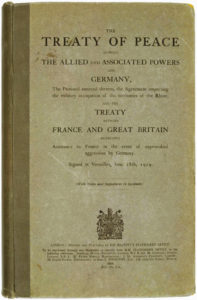Good morning, Whitewater.
Tuesday in town will be partly cloudy with a high of seventy-five. Sunrise is 5:19 AM and sunset 8:37 PM, for 15h 17m 58s of daytime. The moon is a waning crescent with 42.1 percent of its visible disk illuminated.
Whitewater’s Urban Forestry Commission meets at 4:30 PM, and later there will be a joint Common Council and CDA meeting at 6:00 PM.
On this day in 1919, the Germany signs the Treaty of Versailles with the Allied Powers:
The Treaty of Versailles (French: Traité de Versailles) was one of the peace treaties at the end of World War I. It ended the state of war between Germany and the Allied Powers. It was signed on 28 June 1919, exactly five years after theassassination of Archduke Franz Ferdinand. The other Central Powers on the German side of World War I were dealt with in separate treaties.[7] Although the armistice, signed on 11 November 1918, ended the actual fighting, it took six months of negotiations at the Paris Peace Conference to conclude the peace treaty. The treaty was registered by the Secretariat of the League of Nations on 21 October 1919.
Of the many provisions in the treaty, one of the most important and controversial required “Germany [to] accept the responsibility of Germany and her allies for causing all the loss and damage” during the war (the other members of the Central Powers signed treaties containing similar articles). This article, Article 231, later became known as the War Guilt clause. The treaty forced Germany to disarm, make substantial territorial concessions, and pay reparations to certain countries that had formed the Entente powers. In 1921 the total cost of these reparations was assessed at 132 billion Marks (then $31.4 billion or £6.6 billion, roughly equivalent to US $442 billion or UK £284 billion in 2016). At the time economists, notably John Maynard Keynes, predicted that the treaty was too harsh – a “Carthaginian peace” – and said the reparations figure was excessive and counter-productive, views that, since then, have been the subject of ongoing debate by historians and economists from several countries. On the other hand, prominent figures on the Allied side such as French MarshalFerdinand Foch criticized the treaty for treating Germany too leniently.
The result of these competing and sometimes conflicting goals among the victors was a compromise that left no one content: Germany was neither pacified nor conciliated, nor was it permanently weakened. The problems that arose from the treaty would lead to the Locarno Treaties, which improved relations between Germany and the other European Powers, and the re-negotiation of the reparation system resulting in the Dawes Plan, the Young Plan, and the indefinite postponement of reparations at the Lausanne Conference of 1932.
On this day in 1832, Gen. Atkinson heads toward Lake Koshkonong:
1832 – Atkinson starts up Rock River in Black Hawk War
On this date General Henry Atkinson and the Second Army began its trip into the Wisconsin wilderness in a major effort against Black Hawk. The “Army of the Frontier” was formed of 400 U.S. Army Regulars and 2,100 volunteer militiamen in order to participate in the Black Hawk War. The troops were headed toward the Lake Koshkonong area where the main camp of the British Band was rumored to be located. [Source:Along the Black Hawk Trail by William F. Stark, p. 93-94]
A Google a Day ask a geography question: “The castle that sits on top of the volcanic mound, Beblowe Craig, was founded by what 16th century king?”

